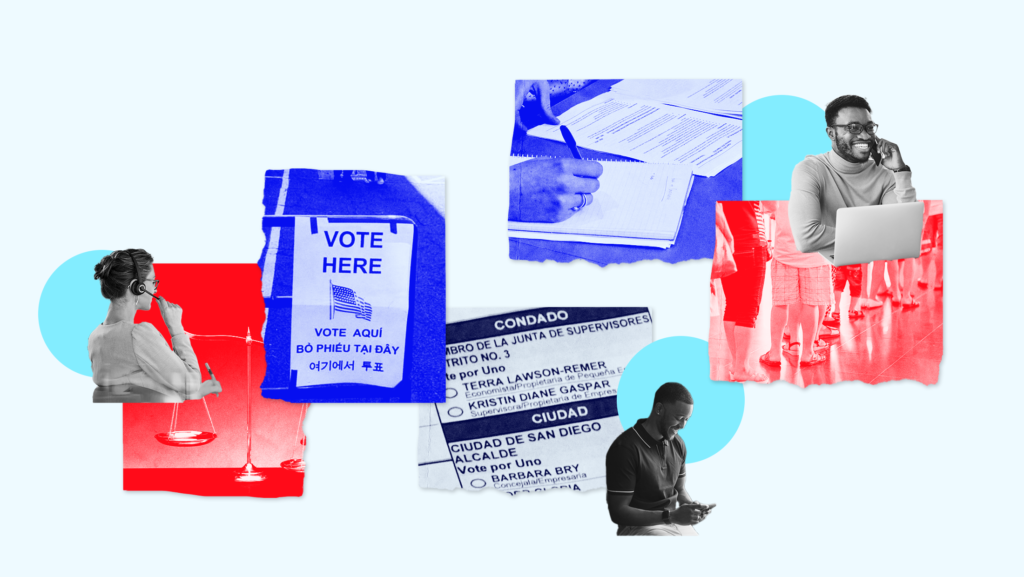Lawyers Can Make the Difference This Election

It was Election Day in 2012; 5 a.m. in Arizona.
I was opening the voter protection boiler room — a small, windowless area that would soon be filled with lawyers on phones talking to on-the-ground voter protection volunteers at polling places across the state and helping troubleshoot questions in real time.
Throughout that Election Day, hundreds of lawyers volunteered their time, working for hours to help voters. Some of the voting issues we encountered were simple and could be solved in minutes: What kind of IDs are valid? Can voters still register to vote on Election Day? How do voters prove their places of residence?
But sometimes we got more complicated — and often nefarious — questions. We saw voter intimidation, purposefully confusing election laws or even outright lies aimed at turning away voters from exercising their constitutional right to vote. We worked late into the night, fueled by caffeine and donuts, answering thousands of questions from voters until the polls closed.
I left that voter protection office late that night exhausted, but exhilarated. I had been part of a community of lawyers working on the front lines of the fight to ensure every person — regardless of race, age, ZIP code or any other factor — could make their voice heard at the polls.
But seeing how many challenges voters faced when trying to cast their ballots also gave me pause. It was clear that language barriers, information gaps and other systemic challenges still made voting too difficult for many, especially people from underrepresented communities.
I became a lawyer to fight for those communities. I believe the law can be an engine for change, protecting the most vulnerable, fighting for justice and defending our values. Now, a full decade after my experience in Arizona, we’ve made some progress in some parts of the country. But the voting process is still cumbersome and confusing for many, and resources to help them navigate the challenges they face are scarce.
We The Action (WTA) is trying to change that.
WTA, an initiative of Civic Nation, believes that lawyers have a special role to play in closing the gap that too many people face in accessing democracy and justice. We are a community of more than 43,000 volunteer lawyers and over 500 nonprofit organizations working together on the most pressing issues facing the nation: defending the right to vote, advocating for reproductive justice, supporting immigrant communities and much more.
From the day we launched, WTA has worked around the clock to ensure elections were safe, secure and accessible for everyone. In 2020 alone, 27,000 WTA lawyers donated more than 170,000 hours to 52 organizations protecting the election.
I took over as executive director of WTA last month, and I’ve seen firsthand how organizations in communities nationwide — with our volunteer lawyers by their side — are strengthening our democracy and closing the access to justice gap for some of our most marginalized communities.
At WTA, we are fighting back. We want to see a world where there are no gaps among people’s ability to access our democracy or justice.
In Florida, the Florida Rights Restoration Coalition is leading the charge on helping people with previous felony convictions — known as returning citizens — restore their right to vote. By connecting returning Floridians with a pro bono lawyer, we help these individuals navigate the labyrinth of red tape and fees that would have otherwise excluded eligible voters from casting their ballots. To date, WTA volunteer lawyers have served more than 15,000 returning Floridians.
Pro bono lawyers have also flocked to volunteer on the 1-866-OUR-VOTE voter protection hotline. Managed by Election Protection, the nation’s largest nonpartisan voter protection coalition, this hotline answers questions directly from voters in multiple languages and assists them through the voting process. In 2020 alone, 13,000 WTA lawyers answered questions from nearly 200,000 voters in 10 languages leading up to the election.
With the midterm elections around the corner, more than 2,000 WTA lawyers have already donated more than 9,000 hours to protect the right to vote. In recent months, our lawyers have provided legal advice to election administrators facing threats and harassment, created guides to empower nonprofits to run civic engagement programs and supported the Power the Polls poll worker recruitment effort by updating local resources and volunteering to be poll workers themselves.
Seeing the impact that organizations like these are making, I can’t help but think back to election night 2012. As I downed caffeine and watched my colleagues work to support voters, I deeply understood the important role that lawyers have in breaking down barriers that exclude many from the democratic process.
Let’s be clear: We do not have equal access to democracy or justice because the system is stacked against communities of color, low-income people, non-English speakers and other historically marginalized groups. Over the past two years, we’ve seen lawmakers across the country push anti-democratic legislation to restrict the right to vote and we’ve seen federal efforts to strengthen the right to vote fail in the U.S. Senate.
At WTA, we are fighting back. We want to see a world where there are no gaps among people’s ability to access our democracy or justice. By donating their time, WTA lawyers are bridging that gap and helping voters across the country exercise their power.
We all have an important role to play in the next couple of weeks. Experts are predicting historically high voter turnout in the midterms, and that means more people than ever will need help casting their ballots. Let’s make sure they can.
Anna Chu is the executive director of We The Action, a pro bono legal services group that focuses on social justice.